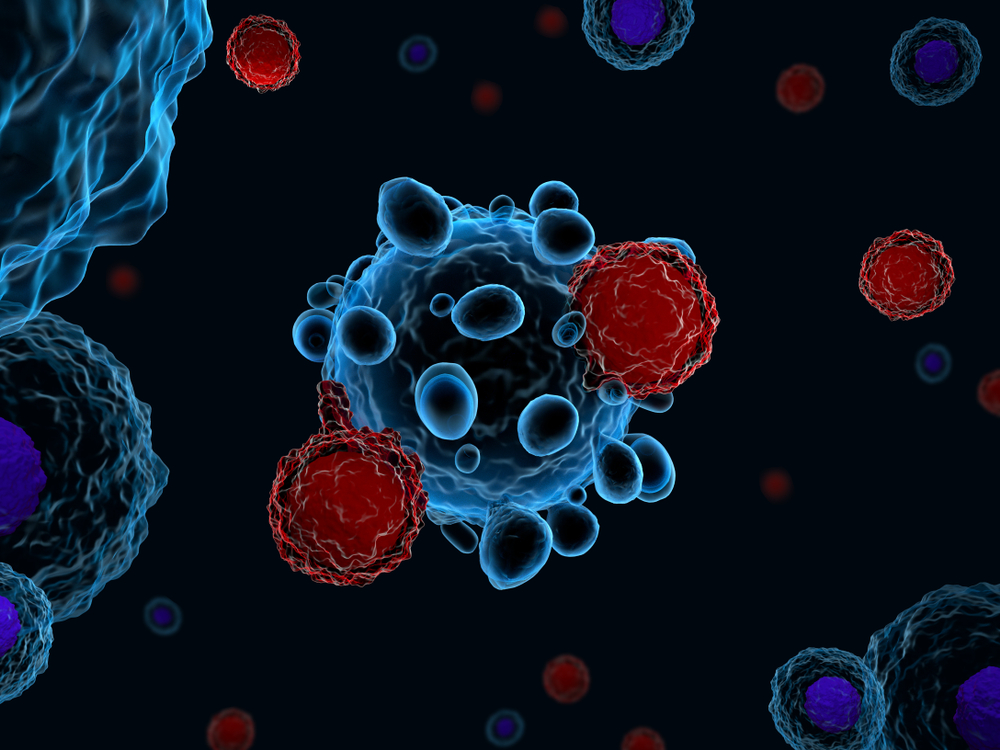Abundant T-helper Cells Evident in MS Patients May Cause Inflammation, Study Reports
Written by |

Scientists identified and “fingerprinted” a group of T-helper cells that are unusually numerous in the blood and central nervous system of people with relapsing-remitting multiple sclerosis (RRMS), and may be the reason behind the neuroinflammation seen in these patients.
This T-cell population carries specific markers involved in the transmission and readout of immune signals, and is known to be less abundant in people using Tecfidera (dimethyl fumarate), an oral therapy for relapsing forms of MS.
The study “GM-CSF and CXCR4 define a T helper cell signature in multiple sclerosis” was published in the journal Nature Medicine.
In people with MS, self-attacking immune cells infiltrate the brain, where they disrupt the transmission of nerve impulses and cause the loss of nerve cells. These immune cells mistakenly attack the myelin sheath, the protective protein coating of nerve fibers, causing inflammation and cell damage.
Scientists have long sought to identify and characterize the properties, or fingerprints, of those groups of immune cells that damage the central nervous system (brain and spinal cord) of MS patients.
An international team led by researchers at the University of Zurich now reports having made significant progress in this area.
“We identified a specific population of white blood cells augmented in the peripheral blood of MS patients that have two properties characteristic of MS: they can move from the blood to the central nervous system and there they can cause inflammation of the nerve cells,” Burkhard Becher, the study’s senior leader with the Institute of Experimental Immunology of the University of Zurich, said in a press release.
To characterize immune cells, researchers used a new technique that makes it possible to quantify dozens of protein markers simultaneously in each cell, known as high-dimensional single-cell mass cytometry (CyTOF).
This powerful technology enables scientists to determine the immune properties of millions of cells in hundreds of samples.
Using this approach, the researchers analyzed groups of immune cells in blood and cerebrospinal fluid (CSF; the fluid that bathes the brain and spinal cord) samples from a large group of healthy donors, RRMS patients, and people with other inflammatory and non-inflammatory conditions.
To deal with such a large amount of data, computational biologists created a machine-learning algorithm that helped them “greatly reduce the data’s complexity, while the interpretation of results is left to the investigators,” Becher said.
Results revealed a population of immune cells in the blood of MS patients that differed from those with other inflammatory and non-inflammatory neurological diseases.
This population consisted of a type of T-helper cell — so-called because these cells help activate other immune cells — that produce granulocyte macrophage-colony stimulating factor (GM-CSF), a signaling molecule (or cytokine) that promotes neuroinflammation. These T-helper cells also produce high levels of an immune receptor called CXCR4.
“The cell population we identified therefore has two key properties that are characteristic of MS: the cytokine causes neuroinflammation, and thanks to the receptors the immune cells can get into the central nervous system,” said Edoardo Galli, also with the University of Zurich and the study’s first author.
Researchers also noted an important observation: the T-helper cells identified were highly represented in the CSF and brain lesions of MS patients, suggesting a direct contribution to disease development.
Consistent with this idea, one year of treatment with Tecfidera (marketed by Biogen) led to a lower percentage of these cells in patients’ blood, indicating that this cell population can be “a specific therapeutic target in MS,” researchers wrote.
“Our data clearly indicate a stringent association of this signature to MS, and we believe that the identification of such an easily accessible biomarker brings important value for MS monitoring,” Becher said.
The research team caution, however, that it is too early to be certain that T-helper cells are at the root cause of MS. More studies are needed to possibly confirm this hypothesis.


